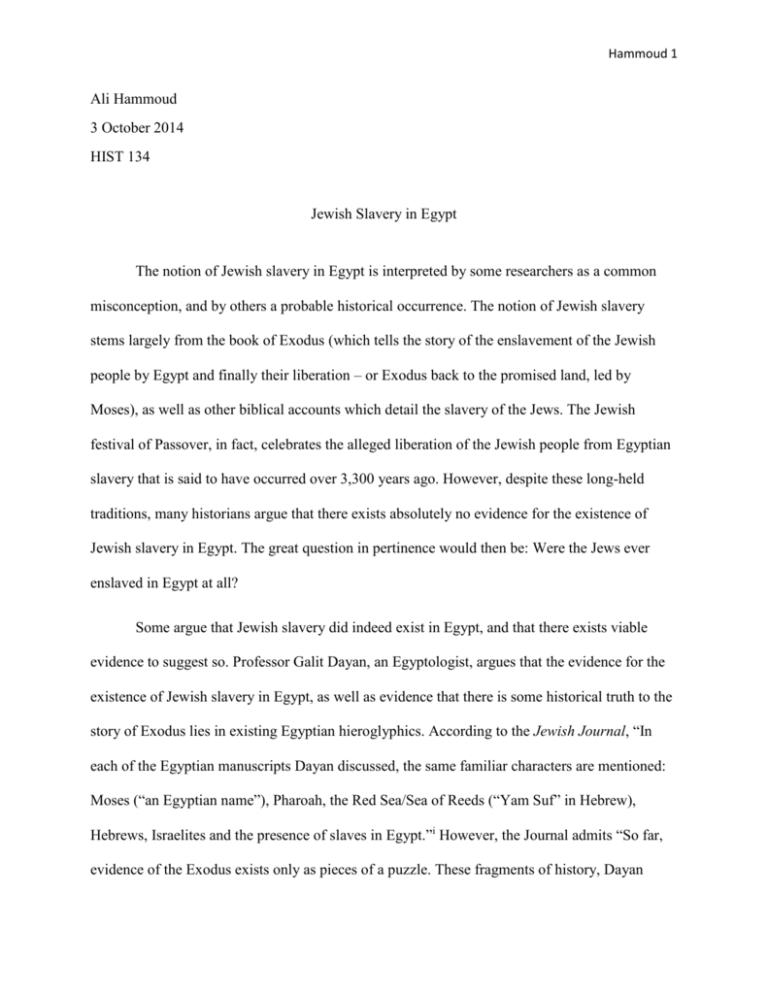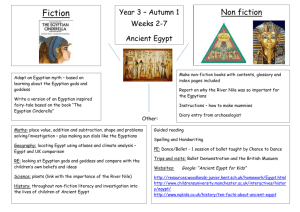File - Ancient HIstory
advertisement

Hammoud 1 Ali Hammoud 3 October 2014 HIST 134 Jewish Slavery in Egypt The notion of Jewish slavery in Egypt is interpreted by some researchers as a common misconception, and by others a probable historical occurrence. The notion of Jewish slavery stems largely from the book of Exodus (which tells the story of the enslavement of the Jewish people by Egypt and finally their liberation – or Exodus back to the promised land, led by Moses), as well as other biblical accounts which detail the slavery of the Jews. The Jewish festival of Passover, in fact, celebrates the alleged liberation of the Jewish people from Egyptian slavery that is said to have occurred over 3,300 years ago. However, despite these long-held traditions, many historians argue that there exists absolutely no evidence for the existence of Jewish slavery in Egypt. The great question in pertinence would then be: Were the Jews ever enslaved in Egypt at all? Some argue that Jewish slavery did indeed exist in Egypt, and that there exists viable evidence to suggest so. Professor Galit Dayan, an Egyptologist, argues that the evidence for the existence of Jewish slavery in Egypt, as well as evidence that there is some historical truth to the story of Exodus lies in existing Egyptian hieroglyphics. According to the Jewish Journal, “In each of the Egyptian manuscripts Dayan discussed, the same familiar characters are mentioned: Moses (“an Egyptian name”), Pharoah, the Red Sea/Sea of Reeds (“Yam Suf” in Hebrew), Hebrews, Israelites and the presence of slaves in Egypt.”i However, the Journal admits “So far, evidence of the Exodus exists only as pieces of a puzzle. These fragments of history, Dayan Hammoud 2 admits, appear within different manuscripts written at different times. “People today are still looking for the one piece, the one story — the Egyptian haggadah — that will include all the elements of the story together,” she said” i So there are obviously problems with the thesis that Jewish slavery exists simply because of a comparable correlation between some hieroglyphics and elements portrayed in the story of Exodus. One of the major problems for those attempting to argue for the existence of Jewish slavery in Egypt, is that there is absolutely no evidence for this aside from biblical accounts and the book of Exodus itself. There are no real archeological findings that would suggest the Jews were actually enslaved in Egypt – certainly modern archeologists have declared the struggle to find evidence for Exodus itself to be “a fruitless pursuit”ii One of the biggest problems with this narrative is that there is not a lot of evidence that would suggest slavery as a widespread institution existed in Egypt in the way that some would think. It is widely known and widely accepted by modern historians today that, for example, the Egyptian pyramids were not built by slaves, but were built by a mandated corvee issued by the Egyptian government. According to Mark Lehner, an archeologist who specialized in answering the question of who built the pyramids: “There were slaves in Egypt, says Lehner, but the discovery that pyramid workers were fed like royalty buttresses other evidence that they were not slaves at all, at least in the modern sense of the word”iii. Carol Meyer’s scholarly book Exodus claims that mentions of actual slavery in the book of Exodus are not directly found, and that such an interpretation is a result of linguistic complications. According to Meyer, the book of Exodus uses the word “ebed”iv to summarize the condition of the Israelites – but this word does not necessarily translate into slave. The world translates into roughly servant, which can mean a variety of things: one who is subordinate to a higher government official in some way, or – it could mean a servant of god, a title that the ancient Israelites proudly identified with. Indeed, Hammoud 3 according to the same source no form of race-based slavery was ever even mentioned in the Hebrew bible. Overall, the evidence that the Jewish people were enslaved in Egypt is very limited, or arguably even non-existent. That is not to say it is impossible for the Jewish people to have endured many hardships at the hand of the Egyptians, but that there is simply no conclusive evidence that this took the form of bondage. Hammoud 4 1. 1Danielle, Berrin. "Passover Proof Lies in Egyptian Hieroglyphs | Passover." Jewish Journal News. Jewish Journal News, 24 Mar. 2010. Web. 03 Oct. 2014. 2. Dever, William G. What Did the Biblical Writers Know, and When Did They Know It?: What Archaeology Can Tell Us about the Reality of Ancient Israel. Grand Rapids, MI: Eerdmans Pub., 2001. Print. 3. Shaw, Jonathan. "Who Built the Pyramids?" Harvard Magazine. Harvard Magazine, July-Aug. 2003. Web. 05 Oct. 2014. 4. Meyers, Carol L. Exodus. Cambridge: Cambridge UP, 2005. Print.2






